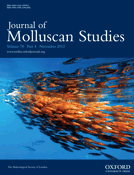
JOURNAL OF MOLLUSCAN STUDIES
Scope & Guideline
Highlighting the vital roles of mollusks in our ecosystems.
Introduction
Aims and Scopes
- Phylogenetics and Systematics:
The journal publishes studies that delve into the evolutionary relationships among molluscan species, employing molecular techniques and morphological analyses to resolve taxonomic ambiguities and propose new classifications. - Ecology and Behavior:
Research in this area examines the ecological interactions of mollusks with their environments, including behavioral studies, population dynamics, and responses to environmental changes. - Biomineralization and Physiology:
Papers contribute to understanding the biochemical processes involved in shell formation, osmoregulation, and other physiological adaptations of mollusks to their habitats. - Conservation and Management:
The journal highlights research aimed at the conservation of molluscan species and habitats, addressing issues like biodiversity loss, invasive species, and sustainable fisheries management. - Developmental Biology and Morphology:
Studies focus on the developmental processes of mollusks, morphological variations, and implications for taxonomy and evolutionary biology.
Trending and Emerging
- Molecular Phylogenetics and Genomics:
There is an increasing emphasis on molecular techniques, including genomic studies, to explore phylogenetic relationships and genetic diversity among molluscan species, enhancing our understanding of evolutionary processes. - Citizen Science and Community Engagement:
Research involving citizen science initiatives, such as monitoring endangered species, is on the rise, highlighting the importance of public engagement in scientific research and conservation efforts. - Impact of Climate Change on Mollusks:
Studies addressing the effects of climate change on molluscan populations and their habitats are gaining prominence, reflecting the urgent need to understand and mitigate the impacts of environmental change. - Microbiome Studies:
Investigations into the microbiomes of mollusks are emerging as a significant area of research, revealing insights into the health, ecology, and evolution of these organisms. - Ecological and Behavioral Adaptations to Urbanization:
There is a growing interest in studying how mollusks adapt to urban environments, focusing on their ecological roles and responses to anthropogenic changes.
Declining or Waning
- Traditional Morphological Studies:
There has been a noticeable decrease in purely morphological studies that do not integrate molecular techniques. Researchers are increasingly favoring multidisciplinary approaches that combine genetic data with morphological analysis. - Historical and Paleontological Research:
Topics related to historical distributions and paleontological studies of mollusks appear less frequently, possibly due to a greater focus on contemporary ecological and conservation issues. - Taxonomic Descriptions of Common Species:
The journal has shifted away from publishing extensive taxonomic descriptions of well-known or common species, focusing instead on less studied or endangered species, reflecting a trend towards conservation.
Similar Journals
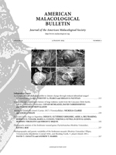
AMERICAN MALACOLOGICAL BULLETIN
Bridging Research and Conservation in Malacology.American Malacological Bulletin is a distinguished journal published by the American Malacological Society, Inc., dedicated to advancing the field of malacology, which encompasses the study of mollusks and their ecological significance. Since its inception, the journal has provided a vital platform for the dissemination of research findings, reviews, and significant contributions from both established and emerging scholars. With an ISSN of 0740-2783 and an E-ISSN of 2162-2698, it holds a global reputation within its niche, albeit recognized within the Q4 category in both Aquatic Science and Ecology, Evolution, Behavior and Systematics based on its 2023 ranking. The bulletin's focus on fostering dialogue and collaboration among researchers around the world underscores its importance within the scientific community. As a resource housed in the Delaware Museum of Natural History, it actively contributes to the ongoing conversation on ecological conservation, biodiversity, and the evolving challenges facing marine ecosystems. Though not classified as an Open Access journal, it remains accessible to scholars and students eager to explore contemporary research in malacology.
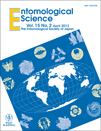
ENTOMOLOGICAL SCIENCE
Bridging Entomology and Ecological UnderstandingENTOMOLOGICAL SCIENCE, published by WILEY, stands at the forefront of research in the field of entomology, focusing on the intricate relationships between insects and their environments. With its ISSN 1343-8786 and E-ISSN 1479-8298, this esteemed journal, based in the United States, has been serving the scientific community since 2005. As a Q3 journal in both Ecology, Evolution, Behavior and Systematics and Insect Science, it presents vital peer-reviewed articles that advance our understanding of insects and their ecosystems. With a Scopus rank of 85/181 in Insect Science, the journal not only reinforces the importance of insect study but also serves as an essential resource for researchers and professionals seeking to explore and disseminate knowledge in this dynamic field. Although it does not offer Open Access options, its scholarly contributions are invaluable for those invested in ecological research and entomological perspectives—making it a must-read for aspiring and established scientists alike.

TAIWANIA
Advancing ecological knowledge, one discovery at a time.TAIWANIA is a prestigious and long-standing journal dedicated to the fields of ecology, evolution, and systematics, published by NATIONAL TAIWAN UNIVERSITY PRESS. Since its inception in 1947, this open-access journal has provided a vital platform for researchers to disseminate their findings, encouraging collaboration and innovation in the ecological sciences. With a 2023 impact factor placing it in Quartile 2 for Ecology and Quartile 3 for Ecology, Evolution, Behavior and Systematics, TAIWANIA is recognized for its quality and influence, ranking #267 out of 461 in Environmental Science and #426 out of 721 in Agricultural and Biological Sciences within Scopus. The journal currently publishes contributions from both local and international researchers, showcasing a diverse array of topics that address crucial ecological issues and facilitate the advancement of knowledge in the discipline. For those seeking rigorous research, engaging reviews, and a commitment to open access, TAIWANIA remains a significant resource for the global scientific community.

ICHTHYOLOGICAL RESEARCH
Transforming aquatic research into conservation action.Ichthyological Research is a prominent journal in the field of ichthyology, focusing on the biology, ecology, and conservation of fish species and their habitats. Published by Springer Japan KK, this journal has been a significant contributor to aquatic research since its inception in 1996 and will continue to disseminate cutting-edge findings through 2024. With an Impact Factor that places it within Q2 of the Ecology, Evolution, Behavior, and Systematics category, it ranks #318 out of 721 in Scopus, situating it in the 55th percentile of its field. This journal serves as a valuable resource for researchers, professionals, and students, offering open access to vital studies that drive forward our understanding of fish ecology and biodiversity. Located in Tokyo, Japan, Ichthyological Research aims to bridge gaps between theoretical research and practical application, emphasizing the conservation of aquatic ecosystems.
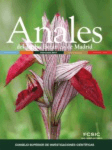
ANALES DEL JARDIN BOTANICO DE MADRID
Connecting Botanical Research with Global InsightsANALES DEL JARDIN BOTANICO DE MADRID is a prominent open-access journal dedicated to the field of Botany, specifically focusing on both Plant Sciences and the broader domains of Ecology, Evolution, Behavior, and Systematics. Published by the esteemed CONSEJO SUPERIOR INVESTIGACIONES CIENTIFICAS-CSIC, this journal has been a vital source of knowledge and academic discourse since its inception. The journal has an ongoing commitment to disseminating research findings, with open access established since 1997, thereby ensuring that valuable scientific insights are readily available to researchers, professionals, and students worldwide. With an impact factor that reflects its relevance in the field and ranked in the Q3 category for Ecology, Evolution, Behavior and Systematics and Plant Science for the year 2023, ANALES DEL JARDIN BOTANICO DE MADRID serves as an essential platform for the publication of innovative studies and the exchange of ideas in the botanical community. The journal covers a variety of topics, from plant morphology and taxonomy to conservation biology, contributing significantly to the advancement of botanical sciences. Researchers looking to enrich their work and engage with a global audience will find this journal an invaluable resource.

JOURNAL OF CONCHOLOGY
Fostering Knowledge in ConchologyJOURNAL OF CONCHOLOGY, published by the Conchological Society of Great Britain & Ireland, is a prominent academic journal focused on the study of mollusks, specifically their taxonomy, ecology, and evolutionary biology. Through its rigorous peer-review process, it aims to provide a platform for significant research in the field, fostering deeper understanding and appreciation of these diverse organisms. Although it is not currently an Open Access journal, its publications contribute notably to the fields of Agricultural and Biological Sciences, notably in Ecology, Evolution, Behavior and Systematics and Aquatic Science, as indicated by its rankings in Scopus. The journal's archives trace comprehensive coverage from 1981 to 1990 and from 1996 to 2018. With its commitment to advancing conchological knowledge, the JOURNAL OF CONCHOLOGY serves as a crucial resource for researchers, professionals, and students invested in the biological and ecological dimensions of mollusk studies.
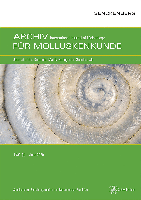
ARCHIV FUR MOLLUSKENKUNDE
Pioneering Insights in Mollusk ResearchARCHIV FUR MOLLUSKENKUNDE, published by E SCHWEIZERBARTSCHE VERLAGSBUCHHANDLUNG, is a premier journal dedicated to the study of mollusks, covering a broad spectrum of topics from taxonomy and ecology to conservation and biodiversity. With its commitment to advancing knowledge and fostering collaboration within the malacological community, this journal serves as an essential resource for researchers, professionals, and students alike. Though it is not currently operated under an open-access model, it provides valuable insights and the latest findings in the field, making it indispensable for those involved in mollusk research. Scholars can access the journal's rich repository of articles, ensuring their work remains at the forefront of scientific inquiry. The journal operates out of Stuttgart, Germany, further emphasizing its European scholarly tradition in the environmental and biological sciences.

NAUTILUS
Where Aquatic Science Meets Scholarly ExcellenceNAUTILUS is a distinguished journal published by the Bailey-Matthews Shell Museum, dedicated to advancing the understanding of aquatic sciences as well as ecology, evolution, behavior, and systematics. With an ISSN of 0028-1344, NAUTILUS has played a significant role in the scholarly community from its inception, with publication converged between 1996 to 2015 and 2017 to 2024. Although currently categorized as Q4 in Aquatic Science and Ecology, Evolution, Behavior and Systematics for 2023, the journal has a reputation for publishing high-quality research that contributes to the broader scientific discourse. Researchers and students alike can benefit from the insights provided by NAUTILUS, which remains committed to exploring the intricate relationships within aquatic ecosystems. Its editorial management, led by Dr. José H. Leal, ensures rigorous peer review and academic excellence, making it a crucial resource for those dedicated to discovering the complexities of aquatic and ecological research.

CRUSTACEANA
Illuminating Crustacean Ecology and EvolutionCRUSTACEANA, published by BRILL, stands as a pivotal resource in the field of Animal Science and Zoology as well as Aquatic Science, with a focus on advancing the understanding of crustacean biology, ecology, and evolution. With an ISSN of 0011-216X and an E-ISSN of 1568-5403, this journal has been curating significant research since its inception in 1960 and continues to contribute scholarly knowledge up to 2024. Although it operates without an Open Access option, CRUSTACEANA holds a commendable Q3 ranking in both the Animal Science and Aquatic Science categories for 2023. Furthermore, it consistently provides insightful articles that enrich the academic dialogue surrounding aquatic ecosystems, making it a valuable platform for researchers, professionals, and students alike.
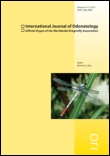
INTERNATIONAL JOURNAL OF ODONATOLOGY
Bridging Ecology and Evolution through Odonate StudiesINTERNATIONAL JOURNAL OF ODONATOLOGY, published by Wachholtz Verlag GmbH, is a vital resource for researchers and professionals in the fields of Ecology, Evolution, Behavior, and Insect Science. Established in 1998, this journal provides a platform for the dissemination of innovative research pertaining to odonatology, encompassing the ecological and biological interactions of dragonflies and damselflies. With its focus on advancing knowledge within these scientific disciplines, the journal holds a commendable Q3 ranking in Ecology, Evolution, Behavior and Systematics and a Q2 ranking in Insect Science for 2023, reflecting its significance in academic circles. Although it operates without open access, its articles are accessible through institutional subscriptions, allowing for wide dissemination among scholars and practitioners. The journal's commitment to publishing high-quality, peer-reviewed research makes it an authoritative source of information that enriches the study of odonates and their broader ecological contexts. For inquiries, the journal's editorial team can be reached at C/O Fleet7, Fleethorn 7, Kiel 24103, Germany.